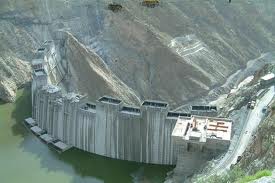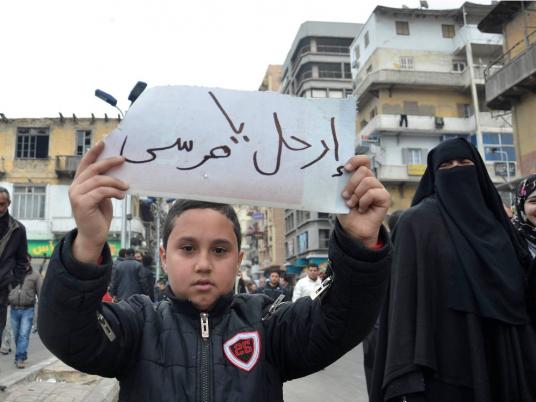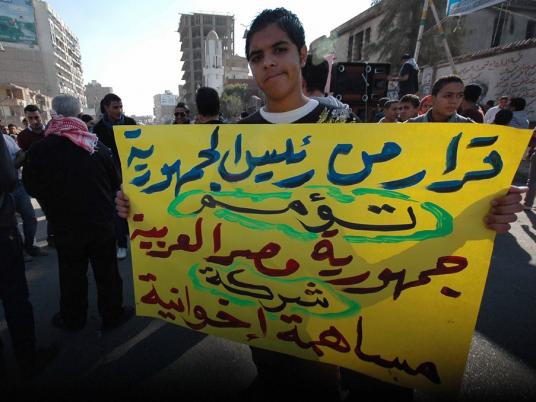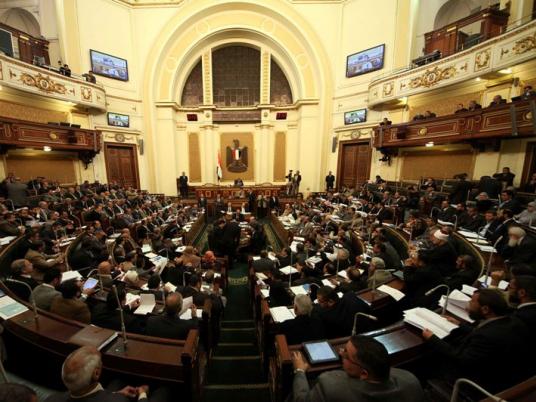Standing out from the crowd is today’s Al-Ahram, being the only paper with a main headline not related to the Naga Hamadi church shooting. Instead, priority was given to financial issues in an exclusive story detailing how measures taken by the Central Bank in early 2009 had resulted in LE20 billion within the financial sector today; a sum being allocated for real estate investments. Al-Ahram’s leading story ended with predictions from “reliable sources,” foreseeing a gradual economic revival for 2010.
Concerning the Naga Hamadi incident, Al-Ahram joined the other papers in reporting the arrest of the three gunmen who left seven dead and 10 wounded in the wake of their drive-by shooting at a church in Upper Egypt. According to the paper’s report, the three men turned themselves in, emerging from their hideout in a field after realizing there was no way around the police blockades, which formed “a tightening noose around the village.” Allegedly, the murderers were frustrated with the local villagers’ unwillingness to assist in escaping, further prompting them surrender to authorities. Al-Ahram, which printed pictures of the gunmen while failing to mention their names in its front page story, reported the incident was a case of revenge—a response to a Christian man’s rape of a young Muslim girl.
In Al-Akhbar, where the gunmen were named but not photographed, the incident was still a case of revenge, yet this time for the death of one of the killers’ daughters, who died during birth at the hands of a Christian doctor. Al-Wafd reported the same motive as Al-Ahram, while Al-Shorouq failed to mention a motive of any sort, instead focusing on details such as the type of guns used, the license plate number of the car, and the number of bullets fired (twenty-one) in a drive-by shooting that left eight people dead and as many wounded. Mohamed el-Kamouny, a resident of the village and one of the shooters, yet, strangely not one of the names printed in Al-Akhbar, was, according to authorities, stating: “he has been arrested five times previously for assaulting Muslims and Christians of Naga Hamadi alike.” El-Kamouny also murdered two people with a knife two years ago, a crime he was briefly sent to jail for. Al-Shorouq also reported violent riots at Naga Hamadi following the incident, in which members of the Coptic community allegedly stormed the hospital were the victims had been taken, destroyed several local businesses, and attacked police trucks, to which police forces responded with tear gas and rubber bullets.
Al-Wafd, which reported the same motive as Al-Ahram, printed the gunmen’s names in full, listing el-Kamouny as one of them, stated that all three perpetrators had extensive criminal records prior to the shooting. Al-Wafd went on to outline the police’s efforts in tracking down and entrapping the killers, before ending on a similar note as Al-Ahram– a reiteration of speeches made by imams and priests since the tragic event, emphasizing the shooting as a singular incident and promoting unity between Egypt’s Muslim and Christian populations.
Apart from the Naga Hamadi incident, Al-Ahram placed an attention-grabbing red frame around its report on the failure of the Egyptian Radio and Television Union to reach an agreement with Al-Jazeera Sports Channel concerning broadcasting rights for upcoming football matches. Union leader Osama el-Sheikh stated that negotiations had reached a “dead end” with Al-Jazeera asking for LE55 million for one-time broadcasting rights to ten soccer games based on a selection made by the channel itself. In Al-Akhbar, el-Sheikh stated, in regards to the same issue: “The matches will not be broadcast on local television or satellite channels or radio…even Al-Jazeera subscribers will not be able to watch the matches due to a technical glitch that prevents decoding.”
Al-Akhbar saved its red box for British MP and anti-war activist George Galloway in a story enthusiastically titled “Farewell!!” which stated that Galloway left Egypt on his own free will and was not deported (as was reported in some sources), although not before the Foreign Ministry informed him that he was “unwanted and would not be allowed to return to Egypt in the future”, to which, according to Al-Dostour, Galloway replied, saying that it does not please him that he has to come to Egypt, and that he has no desire to ever return. Both Al-Dostour and Al-Wafd mentioned that Galloway had to rely on Egyptian security forces to transport him safely from Rafah to Cairo airport, with Al-Akhbar suggesting that Galloway’s safety was in danger as many Egyptians held him personally responsible for the “casualties suffered by Egyptian security forces” as a result of the disruptions caused by his followers.
Al-Dostour also ran a story with the headline “New Israeli air raids on Gaza and bombings of the tunnels along the Egyptian border.” The raids, according to the paper’s coverage, were “the most violent attacks since the war on Gaza ended a year ago.” The attacks left 2 Palestinians dead and 10 wounded. As for the bombing of the tunnels along the Egyptian border, witnesses report the blasts occurred in abandoned buildings and open spaces.
Al-Wafd mentioned a recent Israeli report on Arab economies, which concluded that the newly constructed wall on the Egypt-Gaza border could potentially anger thousands of Egyptian youths, who depends on over-the-border smuggling for their livelihood. According to the report, smuggling activities bring in a total of over US$1 billion a year, a number that would undoubtedly see significant decrease due to the wall.
Al-Shorouq ran a story on Mohamed Ibrahim Soliman, reporting that the former Minister of Housing managed to illegally secure eight seaside villas for his family and friends in North Coast resort Marina. According to Al-Shorouq, one of the properties was listed in the name of his son, who is underage and technically, cannot possess property. However, that did not stop the teenager from showing up in person to the HQ of New Cairo local authorities and paying LE200,000 in cash for the villa.




